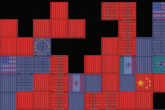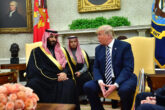April 23, 2020
U.S. Sanctions and COVID-19
On April 17, the CNAS Energy, Economics, and Security (EES) program held a live discussion on U.S. sanctions policy and the COVID-19 pandemic. EES Program Director and Senior Fellow Elizabeth Rosenberg, joined by Adjunct Senior Fellow Peter Harrell, moderated the discussion with the Director of the Office of Foreign Assets Control (OFAC) at the U.S. Department of the Treasury, Andrea Gacki; Former OFAC Director and Partner at Morrison & Foerster, John Smith; and Chairman of the Center on Economic & Financial Power at the Foundation for Defense of Democracies and Chairman and Co-Founder of the Financial Integrity Network, Juan Zarate. Here are some top takeaways.
The Treasury Department emphasized its commitment to ensuring that licenses allow the delivery of goods required to respond to COVID-19, but the administration is maintaining an aggressive posture towards Iran and Venezuela.
On April 16, the Treasury Department published a fact sheet on the provision of humanitarian assistance to sanctioned countries, which is intended to provide greater clarity about the scope of licenses allowing the sale and delivery of medicine and other humanitarian assistance. During the CNAS event, OFAC Director Andrea Gacki reiterated the Treasury Department’s commitment to both general licenses authorizing the provision of humanitarian relief and said that OFAC would prioritize specific license requests seeking to help respond to COVID-19:
“OFAC, which remains operational, is ready to engage to make sure that any requests to provide relief are met with priority and urgency by us. If we can step in to evaluate and help assist ongoing efforts, we will do so.”
Gacki emphasized that licenses exist for a broad swath of goods, including gowns, gloves, and N95 masks. She also discussed the recent launch of a Swiss-based, OFAC-endorsed dedicated payment mechanism for sales of humanitarian products to Iran.
A limited list of goods are subject to additional review because of their dual-use potential, including full-face respirators, diagnostic imaging equipment, and oxygen generators. Gacki noted, however, that OFAC is receiving very few requests for licenses to cover goods and equipment not otherwise exempted from sanctions. John Smith, partner at Morrison & Foerster and a former director of OFAC, offered that the low number of licenses may be due to overwhelming demand for these products in their countries of origin. Many countries, including the United States, have banned or restricted the export of medical devices, PPE, and even some household goods. Even without export controls, domestic demand and hoarding have been high enough to consume stockpiles in several countries, including China, formerly the leading global exporter of face masks. Faced with demands to ramp up production for domestic consumers, the idea of exporting PPE to Iran may be more politically harmful for U.S. businesses than ever.
In addition, the Trump Administration has maintained a hardline rhetorical posture against countries subject to U.S. sanctions, with diplomats at the State Department decrying Iran’s “sanctions relief scam,” and the tough rhetorical posture may be deterring companies from seeking to provide humanitarian goods to Iran.
There is persistent confusion and risk aversion around humanitarian exemptions to sanctions.
Notwithstanding the Treasury Department clarifications, many private sector actors remain confused about the scope of exemptions. In a poll conducted with event attendees, 46 percent said that “business sector confusion about what sanctions currently allow” is the biggest obstacle to selling humanitarian goods to Iran. John Smith said that companies also continue to take a risk-averse approach to sanctioned countries and worry that they could be penalized by regulators in the future. For example, companies are concerned that even if they engage in due diligence and sell humanitarian equipment to a buyer they believe to be legitimate, the goods could later be re-transferred to the IRGC or another sanctioned actor in Iran, and future regulators could blame the company for that fact.
See below for the full results of the event participant poll:
Which of the following is the biggest impediment for businesses trying to sell humanitarian goods to Iran to combat the COVID-19 pandemic?
| Business sector confusion about what sanctions currently allow | 46% |
| There are no/too few viable payment channels | 37% |
| Actual shipment of goods to Iran impossible/too complex | 11% |
| Existing general licenses don't cover all needed products | 5% |
| Iran doesn’t have the money to pay | 1% |
A number of the questions submitted to the panel by members of the audience also illuminated some of the confusion about the scope of humanitarian licenses. Discussion of the questions also showed differences in the scope of the humanitarian licenses in different sanctions regimes as a major impediment for business.
A growing push for new payment channels to sanctioned countries.
The second-most popular answer to the poll was a lack of viable payment channels. Attendees also asked the panelists whether they predict more payment channels will open in the future. Andrea Gacki noted that other channels do exist to provide humanitarian aid to Iran, even as other highly-sanctioned countries like Venezuela and Syria have not received as much attention. She affirmed that OFAC values the Swiss channel, a humanitarian trade arrangement that allows companies to send critical supplies to Iran. However, she said that others, like the INSTEX mechanism, do not offer as much due diligence in OFAC’s view. John Smith argued that humanitarian channels come with a sense of legitimacy because counterparties have been vetted, a crucial factor for businesses seeking to avoid risk during the pandemic. And commentators continue to discuss the need for, and viability of, additional payment channels for Iran and other highly sanctioned countries. On Friday, South Korea announced it had reached an agreement with OFAC to open its own humanitarian payment channel. Andrea Gacki revealed that other states are also in talks to open their own channels.
Unprecedented circumstances call for a rethinking of humanitarian efforts and policy.
Juan Zarate noted that COVID-19 is fundamentally different from past disasters that required humanitarian aid. It’s more difficult than ever for non-governmental organizations (NGOs), commercial suppliers, and banks to know their counterparties, so humanitarian trade during the COVID-19 crisis is both urgent and treacherous. Today, the pandemic is wreaking havoc not only on Iran, but also on the United States, its allies, and global economic and governance systems.
The United States’ direct exposure to the crisis is challenging humanitarian assistance regimes designed for disasters beyond its borders. Going forward, this will impact how Congress and the U.S. policy community evaluate the utility of humanitarian channels and provision of humanitarian aid to sanctioned countries. Andrea Gacki said that OFAC is committed to working with Congress and has taken into consideration its suggestion for a special authorization, like the one created after cyclone Nargis hit Myanmar in 2008. However, OFAC has significantly broadened its existing humanitarian authorizations in recent years so that the U.S. government does not have to “start from scratch” to enable the flow of aid.
If sanctions are a tool of warfare, what does that mean for sanctions policy?
Juan Zarate described sanctions as one vector of warfare, especially when part of a broader effort to influence the actions of an adversary, and pointed out that a number of U.S. adversaries have explicitly stated that they would see certain sanctions actions as an act of war. He also pointed out that U.S. adversaries are engaging in aggressive global disinformation campaigns to delegitimize U.S. sanctions.
While sanctions are clearly different from traditional tools of military force, as they continue to grow in popularity, policymakers may have to grapple with whether, and to what extent, principles of the laws of war should apply. For example, in response to a question, Zarate said he thought concepts drawn from the laws of war such as proportionality (that the use of the tool should be proportional to the threat) and distinction (between combatants and non-combatants) probably should apply to economic sanctions policy as well. However, applying such principles to sanctions also raises challenging questions. For example, many of the people sanctioned in these regimes, like the Iranian Revolutionary Guard Corps (IRGC) in Iran and Putin’s cronies in Russia, are responsible for both serious malign activity and running the economy. Because of this overlap, allowing Specially Designated Nationals (SDNs) to participate in humanitarian relief transactions during a crisis may create additional problems and would require careful consideration and monitoring.
More from CNAS
-
Transatlantic Security / Middle East Security / Energy, Economics & Security
Sanctions Aren’t Enough to Shut Down the Moscow-Tehran Black Market for WarThe geographic scope and extent of Iranian-Russian cooperation highlights the failure of traditional sanctions to prevent Moscow and Tehran from seeking key components like ch...
By Delaney Soliday
-
Game Over?
The trade wargame suggests that sustained high tariffs could create leverage and urgency to spur action toward a productive restructuring of the international trade system....
By Emily Kilcrease & Geoffrey Gertz
-
Middle East Security / Energy, Economics & Security
Trump Inks $600 Bn Deal In Saudi Arabia | Musk, Blackrock CEO Flank Trump In Gulf VisitIn today's episode of India Global, U.S. President Donald Trump secured a $600 billion commitment from Saudi Arabia on Tuesday to invest in the United States. NDTV's Gaurie Dw...
By Daniel Silverberg
-
Energy, Economics & Security / Technology & National Security
Tariffs and Tech: An Uncertain RecipeHigher tariffs could prompt American cloud companies to shift more of their capital investments abroad....
By Pablo Chavez




